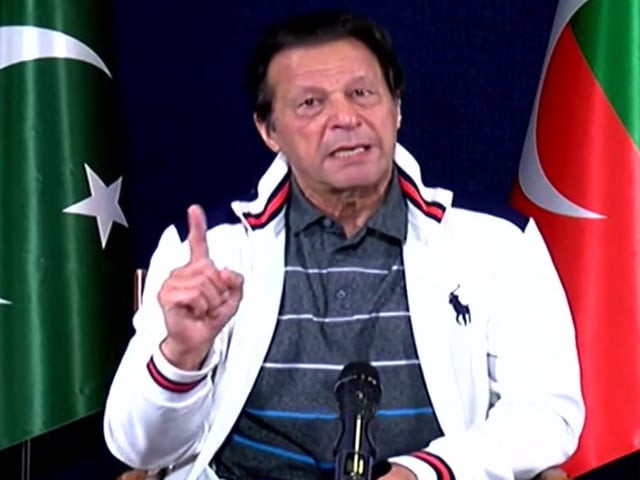Imran challenges NAB law tweaks in SC
PTI chief files constitutional petition under Article 184 (3)

PTI Chairman and former premier Imran Khan on Saturday challenged the recent amendments to the National Accountability Ordinance, 1999 in the Supreme Court, arguing that the tweaks would pave the way for public office holders to get away with white-collar crimes.
The PTI chief has filed a constitutional petition under Article 184 (3) through renowned lawyer Khawaja Haris, who was former premier Nawaz Sharif's counsel in the Panamagate case.
The former premier had earlier declared his intention to challenge the amendments in the apex court and had said they were tantamount to “legitimising” corruption.
Last month, the National Assembly and the Senate passed the Elections (Amendment) Bill 2022 and the National Accountability (Second Amendment) Bill 2021, with a view to bringing the necessary reforms the coalition parties had promised.
The government’s decision to steer the legislation into law was vehemently condemned by Imran, who had termed it a “black day” in the country’s history, charging the “imported government” with ending accountability. He had claimed that the ruling elite would reap the biggest fruits from the tweaks.
Read more: After polls law, Alvi also declines to sign off NAB bill
President Arif Alvi had sent back the bills, following which the government convened a joint sitting of the NA and Senate, which approved them. The president had again refused to sign them, terming them "regressive", and sent them back.
However, 10 days after a joint sitting passes a bill, it is considered law even if the president refuses to give assent.
In the petition, the former premier named the Federation of Pakistan through its Law and Justice Division secretary and the National Accountability Bureau (NAB) through its chairman as respondents in the case.
“The court may very graciously be pleased to declare that amendments made by National Accountability Act 2002 in so far as they substitute section[s] 1(2), 2, 4, 5 (c) (e) (q) and (s), 6 (in so far as it empowers the government in place of the president as the appointing authority for the NAB chairman), Section 9 (a) (v), (vi), (ix), Section 10 (d), Section 18, proviso to sub section b of Section 25 and proviso in Section 26 and further substitute the word ‘National Assembly and the Senate' in place of president in section 23D and so far they omit Section 14, sub section b in the proviso to sub section (a) of Section 15, Clause (g) of Section 21 and Section 23 are ultra vires of the Constitution of Islamic Republic of Pakistan and violative of the fundamental rights of people of Pakistan as gauranteed by Article 9,14, 19A, 24 and 25 of [the] Constitution and direct that accordingly these amendments be struck off from statute books,” the plea read.
The petition contended that most of the amendments were “person-specific” therefore NAB should be asked to provide details of all such cases which were related to prominent and influential holders of public office, especially about the cases pertaining to offences of owning assets beyond known sources of income and misuse of authority.
Also read: Imran throws SC challenge to NAB tweaks
The petition also objected to the amendment, which restricted the NAB chairman to complete an inquiry within six months.
It questioned the substitution of Section 9 of the NAO wherein amendments had been made to the definition of benamidar, as well as the amendments relating to investigation of bank balance of an account holder.
A PTI lawyer said if these amendments were enforced, the suspects would have no need to hire lawyers to defend them.
Senior lawyers believe that the fate of the petition is dependent on the composition of the bench. A larger bench is likely to be formed to hear Imran’s petition.
The PTI chief has approached the apex court several times and was given relief. The SC had even declared him as “Sadiq” and “Ameen” [truthful and trustworthy].
Chief Justice of Pakistan Umar Ata Bandial has already given remarks that they could not ignore any move to minimise the role of NAB. During the hearing of a case, the CJP hinted that they would examine amendments to the NAB law.
However, it is being witnessed in the recent past that SC judges have divergent views about the NAB law.
Justice (retd) Maqbool Baqar questioned the role of NAB in the Saad Rafiq case.
However, CJP Bandial's approach towards NAB cases is very balanced. It is expected that he would consider all aspects while forming a bench to hear Imran’s petition. It has also been learnt that a few SC judges would not be available on the bench next month.
Law Minister Azam Nazeer Tarar in his statement stated that they would defend the amendments to the NAB law. He contended that the government had made 80% amendments, which were introduced by Imran's government itself.
It is yet to be clear as to whether the government will engage a private counsel or the attorney general for Pakistan to defend these amendments.



















COMMENTS
Comments are moderated and generally will be posted if they are on-topic and not abusive.
For more information, please see our Comments FAQ